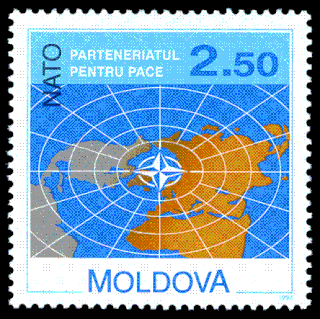Related Research Articles

The Kosovo War was an armed conflict in Kosovo that started 28 February 1998 and lasted until 11 June 1999. It was fought by the forces of the Federal Republic of Yugoslavia, which controlled Kosovo before the war, and the Kosovo Albanian rebel group known as the Kosovo Liberation Army (KLA). The conflict ended when the North Atlantic Treaty Organization (NATO) intervened by beginning air strikes in March 1999 which resulted in Yugoslav forces withdrawing from Kosovo.

The North Atlantic Treaty Organization, also called the North Atlantic Alliance, is an intergovernmental military alliance between 30 member states – 28 European and two North American. Established in the aftermath of World War II, the organization implemented the North Atlantic Treaty, signed in Washington, D.C., on 4 April 1949. NATO is a collective security system: its independent member states agree to defend each other against attacks by third parties. During the Cold War, NATO operated as a check on the perceived threat posed by the Soviet Union. The alliance remained in place after the dissolution of the Soviet Union and has been involved in military operations in the Balkans, the Middle East, South Asia, and Africa. The organization's motto is animus in consulendo liber.
The Rambouillet Agreement, formally the Interim Agreement for Peace and Self-Government in Kosovo, was a proposed peace agreement between the Federal Republic of Yugoslavia and a delegation representing the ethnic Albanian majority population of Kosovo. It was drafted by the North Atlantic Treaty Organization (NATO) and named for the Château de Rambouillet, where it was initially proposed in early 1999. Among other things, the accords called for 30,000 NATO peacekeeping troops in Kosovo; an unhindered right of passage for NATO troops on Yugoslav territory; and immunity for NATO and its agents to Yugoslav law. Yugoslavia's refusal to sign the accords was used by NATO to justify the 1999 bombing of Yugoslavia.

An alliance is a relationship among people, groups, or states that have joined together for mutual benefit or to achieve some common purpose, whether or not explicit agreement has been worked out among them. Members of an alliance are called allies. Alliances form in many settings, including political alliances, military alliances, and business alliances. When the term is used in the context of war or armed struggle, such associations may also be called allied powers, especially when discussing World War I or World War II.
The legitimacy under international law of the 1999 NATO bombing of the Federal Republic of Yugoslavia has been questioned. The UN Charter is the foundational legal document of the United Nations (UN) and is the cornerstone of the public international law governing the use of force between States. NATO members are also subject to the North Atlantic Treaty.

The North Atlantic Treaty Organization (NATO) carried out an aerial bombing campaign against the Federal Republic of Yugoslavia during the Kosovo War. The air strikes lasted from 24 March 1999 to 10 June 1999. The bombings continued until an agreement was reached that led to the withdrawal of Yugoslav armed forces from Kosovo, and the establishment of the United Nations Interim Administration Mission in Kosovo, a UN peacekeeping mission in Kosovo. The official NATO operation code name was Operation Allied Force whereas the United States called it Operation Noble Anvil; in Yugoslavia the operation was incorrectly called Merciful Angel, possibly as a result of a misunderstanding or mistranslation.

The Partnership for Peace is a North Atlantic Treaty Organization (NATO) program aimed at creating trust between the member states of NATO and other states mostly in Europe, including post-Soviet states; 20 states are members. The program contains six areas of cooperation, which aims to build relationships with partners through military-to-military cooperation on training, exercises, disaster planning and response, science and environmental issues, professionalization, policy planning, and relations with civilian government.

The Yugoslav Wars were a series of separate but related ethnic conflicts, wars of independence, and insurgencies that took place in the SFR Yugoslavia from 1991 to 2001. The conflicts both led up to and resulted from the breakup of Yugoslavia, which began in mid-1991, into six independent countries matching the six entities known as republics which previously composed Yugoslavia: Slovenia, Croatia, Bosnia and Herzegovina, Montenegro, Serbia, and North Macedonia. Yugoslavia's constituent republics declared independence due to unresolved tensions between ethnic minorities in the new countries, which fuelled the wars. While most of the conflicts ended through peace accords that involved full international recognition of new states, they resulted in a massive number of deaths as well as severe economic damage to the region.

The Kosovo Force (KFOR) is a NATO-led international peacekeeping force in Kosovo. Its operations are gradually reducing until Kosovo's Security Force, established in 2009, becomes self sufficient.

Agim Çeku is a Kosovan politician, the former minister of Security Forces in Kosovo and formerly the prime minister. Of military background, he was a commander of the Kosovo Liberation Army (KLA) that fought against Serbian rule in 1998–1999, earlier being a commander in the Croatian War of Independence in the Croatian Army.

The Kosovo Protection Corps was a civilian emergency services organisation in Kosovo active from 1999 to 2009.
Humanitarian intervention is the use or threat of military force by a state across borders with the intent of ending severe and widespread human rights violations in a state which has not given permission for the use of force. Humanitarian interventions are aimed at ending human rights violations of individuals other than the citizens of the intervening state. Humanitarian interventions are only intended to prevent human rights violations in extreme circumstances. Attempts to establish institutions and political systems to achieve positive outcomes in the medium- to long-run, such as peacekeeping, peace-building and development aid, do not fall under this definition of a humanitarian intervention.

United Nations Security Council resolution 1244, adopted on 10 June 1999, after recalling resolutions 1160 (1998), 1199 (1998), 1203 (1998) and 1239 (1999), authorised an international civil and military presence in the Federal Republic of Yugoslavia and established the United Nations Interim Administration Mission in Kosovo (UNMIK). It followed an agreement by Yugoslav President Slobodan Milošević to terms proposed by President of Finland Martti Ahtisaari and former Prime Minister of Russia Viktor Chernomyrdin on 8 June, involving withdrawal of all Yugoslav state forces from Kosovo.

NATO is a military alliance of twenty-eight European and two North American countries that constitutes a system of collective defense. The process of joining the alliance is governed by Article 10 of the North Atlantic Treaty, which allows for the invitation of "other European States" only and by subsequent agreements. Countries wishing to join must meet certain requirements and complete a multi-step process involving political dialog and military integration. The accession process is overseen by the North Atlantic Council, NATO's governing body. NATO was formed in 1949 with twelve founding members and has added new members eight times. The first additions were Greece and Turkey in 1952. In May 1955, West Germany joined NATO, which was one of the conditions agreed to as part of the end of the country's occupation by France, the United Kingdom, and the United States, prompting the Soviet Union to form their own collective security alliance later that month. Following the end of the Franco regime, newly-democratic Spain chose to join NATO in 1982.

Kosovo–United Arab Emirates relations are foreign relations between Kosovo and the United Arab Emirates.

French-Serbian relations are foreign relations between France and Serbia. Both countries established diplomatic relations on January 18, 1879, between the French Third Republic and the Kingdom of Serbia. Both countries are members of the United Nations, the Council of Europe, the Partnership for Peace, and the Organization for Security and Co-operation in Europe (OSCE). After a short period of severance caused by the 1999 NATO bombing of Yugoslavia, France's diplomatic relations with Serbia were restored on 16 November 2000. Since 2006, Serbia is an observer on the Francophonie. Also France is an EU member and Serbia is an EU candidate. There are between 70,000 and 100,000 people of Serbian descent living in France.

The Kosovo Security Force is a civilian emergency services organisation of Kosovo under the control and command of KFOR. KSF is tasked with defending the sovereignty and territorial integrity of Kosovo, military support for civil authorities, and participation in international peacekeeping missions and operations. Since 2018, it is in the process of transforming into the Kosovo Armed Forces, a process that is expected to take 10 years.

Kosovo refugees in Albania refers to the mostly ethnic Albanians of Kosovo fleeing the Kosovo War into neighboring Albania in 1999. This crisis was exceptional at the time, as a movement of population this big in such a short period of time was unseen since WWII. In addition to the ones going to Albania, a large number of Kosovo refugees fled to the Republic of Macedonia. Almost all of the remaining 500,000 to 600,000 individuals in Kosovo were also displaced in the region itself, without leaving it.

The Insurgency in Kosovo began in 1995, following the Dayton Agreement that ended the Bosnian War. In 1996, the Kosovo Liberation Army (KLA) began attacking Serbian governmental buildings and police stations. This insurgency would lead to the more intense Kosovo War in February of 1998.

The Battle of Paštrik was a two-week confrontation between the KLA with NATO's support against the Federal Republic of Yugoslavia in 1999, during the Kosovo War. The official goal of the KLA was to seize the border between Albania and Kosovo, and eliminate the Yugoslav units there.
References
- ↑ Gusterson, Hugh (2019-02-01). "Drone Warfare in Waziristan and the New Military Humanism". Current Anthropology. 60 (S19): S77–S86. doi:10.1086/701022. ISSN 0011-3204.
- ↑ Douzinas, Costas (2003-01-01). "Humanity, military humanism and the new moral order". Economy and Society. 32 (2): 159–183. doi:10.1080/0308514032000073383. ISSN 0308-5147.